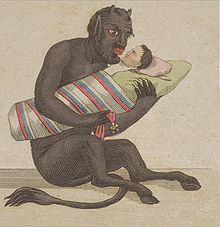Chort


A chort (
Compare to Russian sayings (curses) "чёрт побери" ("chort poberi") – meaning "be taken by the demon" (often used as an exclamation to express frustration or pain as in English "darn!", "rats!", "shit!", etc.), the saying is often used as an acceptable version of cursing in Eastern Europe; "чёрт попутал" ("chort poputal") – meaning mixed up by the demon; "к чертям" ("k chertyam") – meaning to hell, and many others.
Etymology
There are many theories regarding the origins of the
One is that it is the oast passive participle of unattested verb (nouns: *čarъ, *čara (“magic, sorcery”)) that is the exact equivalent of the Lithuanian kerė́ti (“to bewitch”). This etymology is supported by analogies, cf. *vȏrgъ (“foe, enemy; evil spirit”) > *voržiti (“to divine”). This makes it a cognate with Sanskrit कृत्या (kṛtyā, “female demon, sorceress”). Another is that it is aIn Czech and Slovak culture
In Czech and Slovak folk tales, čert is not an evil character per se. It is often trying to tease characters in selling their souls in exchange for something (money, power, completion of a task). This often ends badly for evil or greedy characters, who are tricked into getting useless gifts and then are carried into hell. Other times, čert changes roles from trickster to tricked as he loses a bet against a hero, who outsmarts him, winning his soul back. This way, čert is often tricked to build castle walls in a day, dig fish ponds or even whole river banks, move large stones or create hills and mountains. Sometimes, a positive role of čert is further emphasized, namely in modern or modernized folk tales. Čert is trying to bring evil characters to hell, he often helps or befriends heroes in this process and gives them various magical items and treasures.
The true form of Čert is often a smallish hairy man with a tail, horns and one or two hoofs. But he is a shapeshifter and he tries to trick characters in his nicer forms, before they even realize what he is. In these forms, he is often represented as pretty young man, count, or huntsman (see The Devil and Kate). Often, this transformation is not (and cannot be) complete, so one can recognize čert by small horns hidden in black curly hair, or a single hoofed leg hidden in high boots.
Čert is not the devil, although they might have a lot in common. Sometimes, hell is full of čerts and is ruled by the devil (or archdevil) Lucifer.
In Turkic culture
In Turkic (usually neighboring Slavic) folklore its name is "Çor" (Chor). In Anatolia known as "Çorabaş" (Chorabash). Chors are spiritual creatures mentioned in the pre-Islamic texts and oral tradition who inhabit an unseen world in dimensions beyond the visible universe of humans. Influenced by the later influences of Islamic jinn and devils, folk narratives mentions that the Chors are made of fire, but also physical in nature, being able to interact physically with people and objects and likewise be acted upon. Like human beings, the Chor can also be good (Ak-çor, literally "White Chor"), evil (Kara-çor, "Black Chor"), or neutrally benevolent like humans. The exorcist is called "Çoraman" (Choraman) in Anatolia. There are two different kinds of Chura: Arçura, that comes from the forest and is married to the Orman iyesi, and Biçura, that comes from the cellar and is married to Ev iyesi.
See also
References
- ^ Русские Народные Сказки»/Сост., вступ. ст. и прим. В. П. Аникина.-М.: Правда, 1985.- 576 с., ил.) (in Russian)
- ^ Türk Mitolojisi Ansiklopedik Sözlük, Celal Beydili, Yurt Yayınevi (Pages - 143/144) (in Turkish)
- ISBN 9780786488940.
- ^ Kryzhko, Olena. "National and Cultural Symbolism of Zoo-Anthropomorphic Creatures in Ukrainian Myphological Picture of the World." Logos (08687692) 101 (2019).
- ^ М. Фасмер. Чёрт // Этимологический словарь русского языка / пер. и доп. О.Н. Трубачева, под ред. Б.А. Ларина. — 2-е. — М.: Прогресс, 1986 (in Russian)
- ^ I. Yakubovich. “The Slavic Draughtsman”. Etymology and the European Lexicon. Proceedings of the 14th Fachtagung der Indogermanischen Gesellschaft, B. S. S. Hansen et al. (eds.), Wiesbaden: Harrassowitz, 2017, pp. 529–540.
- ^ https://www.etymonline.com/word/swart | Title: Etymology of the wor swart | webpage:https://www.etymonline.com/word/swart | date checked: 12 April 2022 (in English)
Bibliography
- Афанасьев А. Н. «Поэтические воззрения славян на природу». — М.: 1865−1869. — Том 3, глава 22 (in Russian)
External links
- The name of the city Çorum (Çorum İlinin Adı)[permanent dead link] (in Turkish)
- Çorum Adının Menşei (in Turkish)
